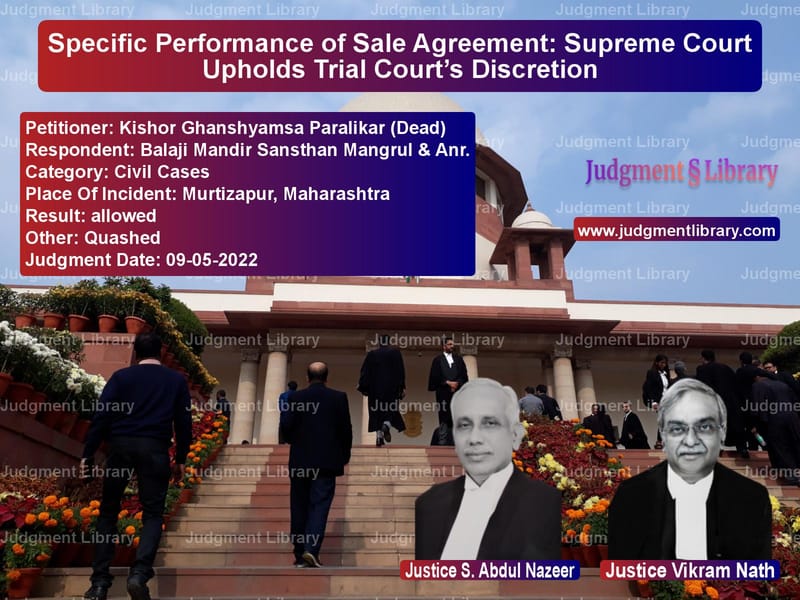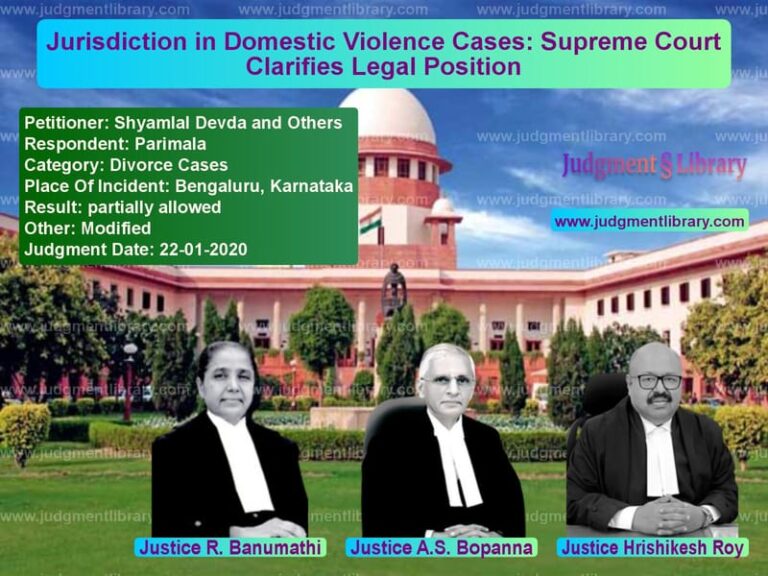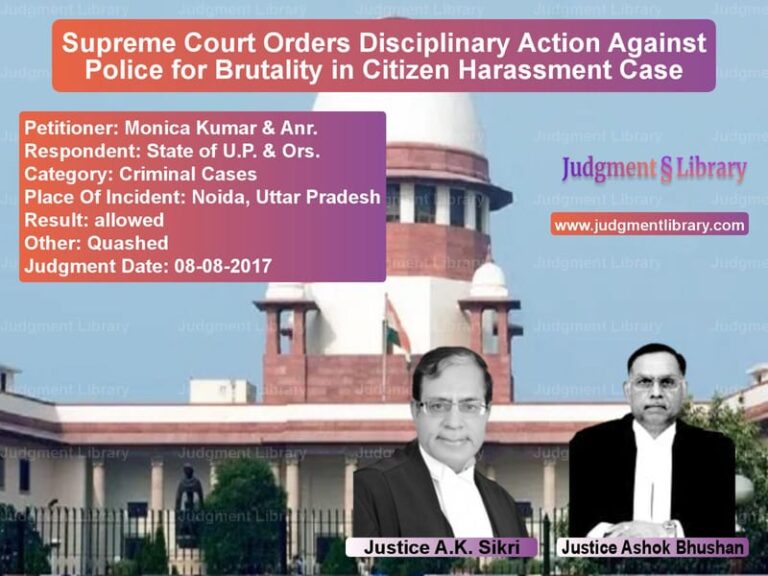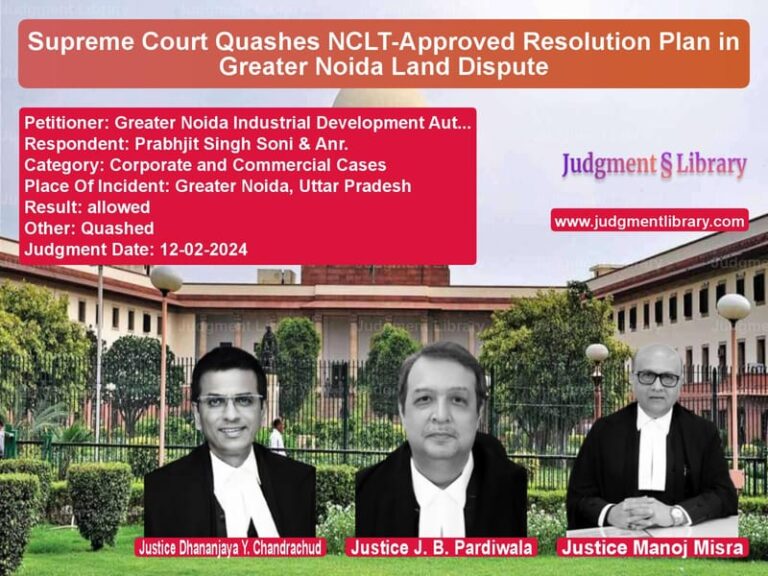Specific Performance of Sale Agreement: Supreme Court Upholds Trial Court’s Discretion
The Supreme Court of India recently ruled in the case of Kishor Ghanshyamsa Paralikar (Dead) vs. Balaji Mandir Sansthan Mangrul (Nath) & Anr., addressing issues of specific performance of a sale agreement and the discretionary power of courts in granting extensions for payment. The dispute arose from a land sale agreement, where the appellant sought enforcement of a compromise decree that the respondent later challenged.
Background of the Case
The appellant had entered into an agreement on September 20, 2002, with the respondent trust for the sale of agricultural land located in Murtizapur, Mangrulpir Taluk, District Washim, Maharashtra. A suit for specific performance was filed, which led to a compromise decree dated December 6, 2010. As per the compromise, the respondent agreed to sell the land for ₹8,78,500. The appellant paid ₹7,31,000 upfront and was required to deposit the balance of ₹1,47,500 within one month.
However, the appellant failed to pay within the stipulated time and sought permission from the court on January 11, 2011, to deposit the remaining amount, which was granted. The sale deed was subsequently executed on January 12, 2011. After three years, the respondent moved to cancel the sale deed, arguing that the delay in payment invalidated the compromise decree.
Arguments of the Petitioner (Kishor Ghanshyamsa Paralikar)
- The appellant had substantially complied with the terms of the compromise by making a large part of the payment immediately.
- The delay of five days in depositing the balance amount was minor and had been rectified with the court’s permission.
- The respondent had executed the sale deed voluntarily and had not objected at the time of deposit.
- Under Section 28 of the Specific Relief Act, 1963, the court had the discretion to extend the time for payment.
Arguments of the Respondents (Balaji Mandir Sansthan Mangrul & Anr.)
- The terms of the compromise decree were clear, and failure to deposit the balance within the specified time voided the agreement.
- The appellant’s application for extension of time was filed after the due date had lapsed, making the sale deed invalid.
- The High Court correctly set aside the trial court’s order and ruled in favor of rescinding the agreement.
Supreme Court’s Observations
The Supreme Court examined Section 28 of the Specific Relief Act and past precedents to determine whether the trial court had exercised its discretion appropriately. The Court noted:
“Section 28 gives the vendor the right to rescission of the contract if the purchaser fails to pay within the stipulated period. However, the court has the discretion to extend the time for payment where justice requires it.”
The Court further relied on Smt. Periyakkal vs. Smt. Dakshyani, observing:
“Even in a compromise decree, the court has the power to grant extensions in rare cases to prevent manifest injustice.”
Judgment and Directions
The Supreme Court ruled:
- The Trial Court was justified in granting an extension as the delay was only five days and did not affect the substantive rights of the parties.
- The High Court erred in canceling the sale deed as the respondent had already accepted the balance payment and executed the sale deed.
- The appeal was allowed, and the High Court’s order was set aside.
- The respondent was directed to comply with the terms of the sale agreement.
Key Takeaways from the Judgment
- The judgment affirms that courts retain discretion in granting extensions even in compromise decrees.
- Minor delays in payment, if rectified within a reasonable time, should not invalidate a contract.
- The ruling ensures that parties cannot challenge an executed sale deed after unreasonably long delays.
Conclusion
The Supreme Court’s decision in Kishor Ghanshyamsa Paralikar vs. Balaji Mandir Sansthan Mangrul provides clarity on the judicial discretion available under Section 28 of the Specific Relief Act. It reinforces that the primary objective of courts is to balance justice and fairness while upholding contractual obligations. By setting aside the High Court’s order, the ruling prevents undue hardships arising from minor procedural delays.
Petitioner Name: Kishor Ghanshyamsa Paralikar (Dead).Respondent Name: Balaji Mandir Sansthan Mangrul & Anr..Judgment By: Justice S. Abdul Nazeer, Justice Vikram Nath.Place Of Incident: Murtizapur, Maharashtra.Judgment Date: 09-05-2022.
Don’t miss out on the full details! Download the complete judgment in PDF format below and gain valuable insights instantly!
Download Judgment: kishor-ghanshyamsa-p-vs-balaji-mandir-sansth-supreme-court-of-india-judgment-dated-09-05-2022.pdf
Directly Download Judgment: Directly download this Judgment
See all petitions in Contract Disputes
See all petitions in Property Disputes
See all petitions in Judgment by S. Abdul Nazeer
See all petitions in Judgment by Vikram Nath
See all petitions in allowed
See all petitions in Quashed
See all petitions in supreme court of India judgments May 2022
See all petitions in 2022 judgments
See all posts in Civil Cases Category
See all allowed petitions in Civil Cases Category
See all Dismissed petitions in Civil Cases Category
See all partially allowed petitions in Civil Cases Category







